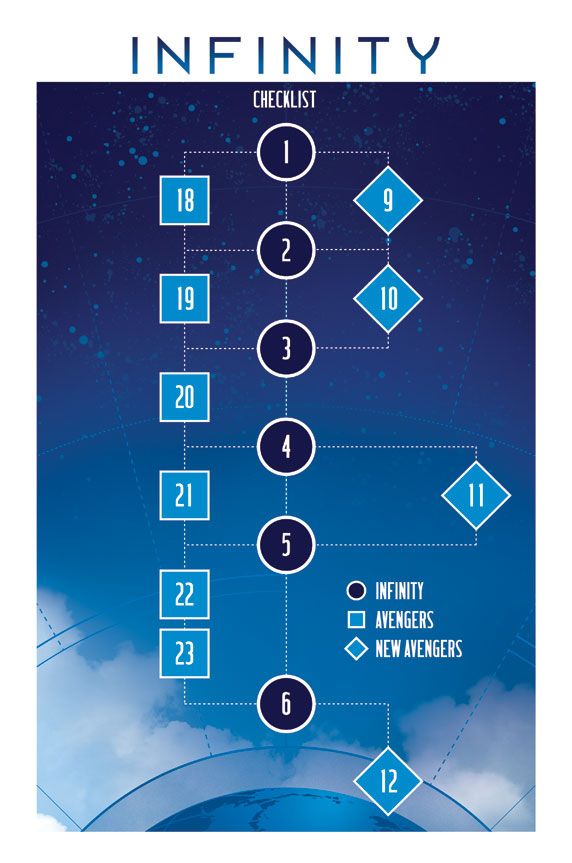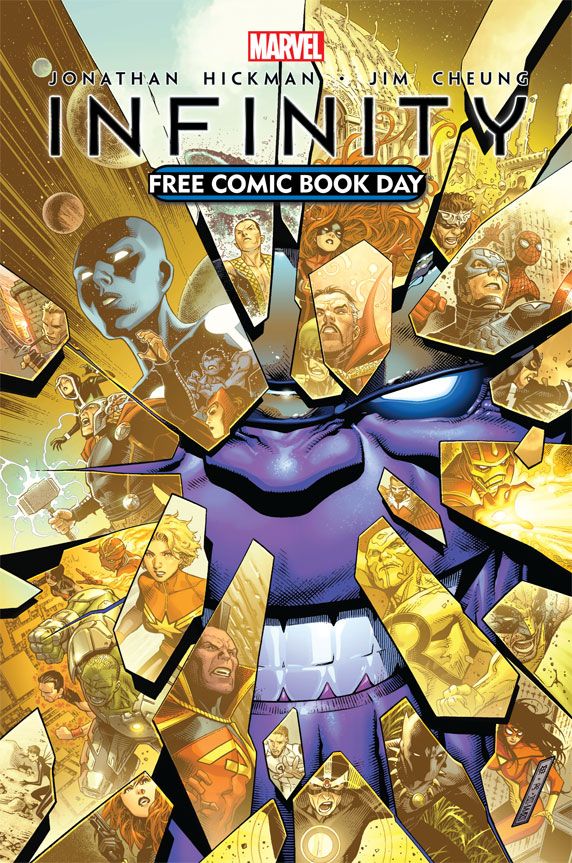There's no going around it: Marvel's fall event Infinity is a slog.
Some people buy the book, read it, and then wonder what it was they just read. Some hate it, like tasting cod liver oil, and swear off of it entirely. There's so much going on in each chapter, and no one holds your hand and explains a thing outside of a few dense bits at the beginning from the previous confusing chapter. It's the first event book I've encountered in a while that actually has required material to read up on before starting it. How many would understand half of what was going on if you hadn't been trying to parse the first issues of Jonathan Hickman's run on Avengers and New Avengers to start with? Those books are all over the place, from the far reaches of space to New York City and Wakanda and Atillan, and new places that just get bombed out the next issues. It's hard to keep track of it all.
Infinity is a little like sticking your hand in concrete: It's thick, difficult to push through, might break your fingers when you try to pull them back out. OK, that last part was an exaggeration, but you get the idea.
The most amazing thing is that all of that work is completely worth it. If you hang in there, Infinity is rather unique in its genre. The story is dense because there is just so much drama happening on every page; there's not a rest between epic layers of destruction and heroic reprisal. After all, if you're going to have Thanos in your story, why not make it as big and bombastic as possible? He's not really a guy to be used lightly, and his grand scheme should be something near-unfathomable to we mortal readers. Not to mention the required reading, like Thanos Rising, was really, really good. This is the best use of the Marvel cosmic scale since Annihilation was blowing our minds under Dan Abnett and Andy Lanning, and even that series could be read to get a little better depth on the space side of the Marvel Universe. There's a lot going on in Infinity and not all of it is going to stick with readers, but a lot of it will, just be the law of averages. Let me put it this way: You can be overwhelmed by the 6.4 million individual points in Georges Seurat's A Sunday Afternoon on the Island of La Grande Jatte, but you have to admit they make up an phenomenal work of art.
And let's face it, other events this year, if not for a few years, haven't been this advanced. Age of Ultron can be easily summed up in a sentence: Wolverine travels through time to stop Hank Pym from creating Ultron and ultimately breaks time by succeeding poorly. The details don't exactly matter, just the result that has led to different story arcs. The title concept, an age of Ultron's rule, is created and destroyed within 10 issues, if even that much. We spent very little time there to get back to the age that really mattered. Any tie-in books were mostly an exercise in the concept (time travel and alternate realities or what it would be like if Ultron had our heroes at their last wits).
Looking back at Infinity Gauntlet, it's a self-contained story in so much as there's a clear beginning, middle and end to the trade paperback. It seems separate enough from the ongoing titles at the time that it's an easy read for new comic fans and remembered fondly by those who followed it when it was first released. Just think for a moment and try to remember the last time a giant story arc definitively concluded. So many of our big events slingshot you into the next one or just the next era of a particular title. You could say that Fear Itself ended as the villain was defeated and clean up was left to Thor's own title and the Fear Itself: the Fearless miniseries. Even then, the impact on Asgard is still being felt to this day.
There's something about what we now call an "event" book, as opposed to a mega-crossover or key storyline, that has become kind of formulaic. Every one of them since Avengers: Disassembled has melded into a simple, functional and seasonal product. The Marvel Universe will never be the same again until the summer, in which it will never be the same again until the fall/beginning of the new year, where it will never be the same again until the summer, and so on. Infinity doesn't so much break this mold (it's a seasonal event that releases the Terrigen Mists over Earth and puts Thanos in our sights again), but expand upon it. There's not one major plot resolution we're working toward, there are several; if it's not Thanos, then it's his army, or the Terrigen, or the galactic upheaval that the Avengers quelled.
There's a cast of thousands in this book, so much so that it's a crime to call this an Avengers event. Every hero that looks to the skies can battle Thanos' lieutenants, be it in New York City or Wakanda or Atlantis or Atillan, or some other world we haven't heard of. There are going to be multiple resolutions to this story that will, yes, stretch it out past being a self-contained tale, but can you imagine that we've released the most genetically evolving substance on to the planet and saved countless worlds across the galaxy and still haven't fought Thanos yet? This isn't a story where two sides line up on the battlefield and have at each other until there's a winner, this is a fairly evolving story as we read along. And the consequences that spill out from Infinity will be continuing through Inhumanity and Avengers and who knows who else?
As excited as Marvel has been to announce what's coming next, we can only assume that Infinity is another point on the complex canvas where Hickman creates his masterpiece.



